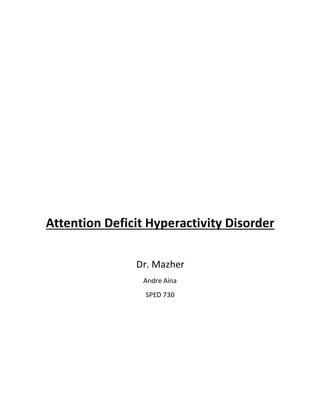
Final Attention Deficit Hyperactivity Disorder
- 1. Attention Deficit Hyperactivity Disorder Dr. Mazher Andre Aina SPED 730
- 2. The distinctive characteristicsof childrenandadolescentswithattentiondeficithyperactivity disorder(ADHD) are excessive motoractivity,inattention,andimpulsiveness.The conceptof ADHD is relativelynewbut,the symptomsof inattention,hyperactivity,andimpulsivityhave previouslybeen describedbyseveral authorsduringthe last200 years.Thispaper will systematicallydetail the historyof the discoveryof ADHD,howchildrenmayinheritordevelopADHD,methodsof treatment,cognitive impairments,ADHDinrelationtofamilyfunctioning,disproportionsinADHDdiagnosisandthe impact on social maintenance throughexplorationof scientificallybasedstudies. The firstexample of adisorderthatappearsto be similartoADHD wasgivenbySir Alexander Crichtonin1798. KnowinglyorunknowinglyCrichtonoriginatedthe observable characteristicsforwhat we nowknowas attentiondeficithyperactivitydisorder,he explainsthat“Whenborn witha personit becomesevidentata veryearlyperiodof life andhasa verybad effect,inasmuchasitrendershim incapable of attendingwithconstancytoanyone objectof education.”Several othernotable pioneer contributingtoADHD researchare mentionedsuchasGermanphysiciansFranzKramerand Hans Pollnowwhose earlydescriptionsactinaccordance withthe secondmainsymptomof ADHD, inattention.The DSM-IV-TRportrayschildrenwithADHDasbeingeasilydistractedresultingindifficulty sustainingattentionintasks.In1994, was it foundthatchildrenwithADDwithouthyperactivitydiffered fromchildrenwithADDwithhyperactivity.Itwasalsofinallyacknowledgedinthe 1990s that ADHD was not entirelyajuveniledisorder,whichdisappearedwithage aswaspreviouslythought,butratheran enduring, persistentdisorderremainingintoadulthoodinmanycases.Thisarticle bringstolightthe fact that ADHD isa fairlynewlyunderstoodcognitive disorder.ResearchinADHDisfar from thorough;there are manyquestionstobe answeredandrocksto be over-turned.
- 3. As of late researchintothe etiologyof ADHDhas beenonthe upswing.A narrative review focusesonthe originsof ADHD thru literature inthe last15 years. AninheritedcontributiontoADHD has beenuniversallyidentified.ADHDlike otherpsychiatricanddevelopmental disorderstendstorunin families.But,highheritabilityestimatesdonotrule outthe influence of environmental risks.The most importantenvironmentalriskfactorsforpsychopathology,includingADHDandits secondaryadverse consequences,are likelytobe affectedbygeneticallyinfluencedparental andchilddispositions;for example,prenatalexposure tomaternal cigarettesmokingorpeerrejectionserveasexamplesof gene- environmental correlation)Therefore,the connectionof environmental riskswithADHDmightemerge completelyorpartlythroughinheritedconfoundsandgeneticrisksmightoperate onpresent phenotypesthroughenvironmental means.Manydifferentenvironmentalfactorshave beenreportedly associatedwith ADHD,butit has beendifficulttoidentifywhichare causal. Thoughthere are manytheoriesandexplanationsforthe occurrence of ADHD,there seemtobe onlytwomethodsof treatment.The twomethodsof treatmentobserve tobe effectiveare medication therapyand behavioral therapy. A studyobservedthe long-termeffectsof the twotreatmentsmedicationtherapyand behavioral therapyforADHD.Theyuseda groupof 579 childrenwithADHDcombinedtype,ages7-9.9 yearsold,ingrades1 through4. Students were assignedto14 monthsof medicationmanagementwith monthlycheck-ins,intensive behavioral treatment,the twotreatmentscombined;forstandard communitycare throughcommunityproviders.Behavioral treatmentsincludedparenttraining,child- focusedtreatment,andaschool-basedinterventionorganizedandintegratedwiththe school year.Six majoroutcome domainswere identified.Withindomains,the measuresloadinghighestfromeach informantwere selected:(1) ADHD(2) oppositional/aggressivesymptoms(3) social skills;(4) internalizingsymptoms(anxietyanddepression)(5) parent-child(6) academicachievement.Resultsof thisstudydemonstratedthe advantage of medicationmanagementoverbehavioral treatmentfor
- 4. ADHD. Combinedbehavioralinterventionandstimulantmedication—multimodaltreatment,the current criterionstandardforADHD interventions—yieldednosignificantlygreaterbenefitsthanmedication managementforcore ADHD symptoms.Thisbringsintoquestionwhetherbehavioral treatmentsare necessaryif medical treatmentsare alsosimultaneouslybeingimplemented? One of the core issuesforchildrenandadolescentscopingwithADHDinregardsto academic achievementstemfromdeficitsinworkingmemoryandexecutive functioning.Researchershave exploreddeeplyintothe workingsof theseprocessesinchildrenwithADHD. A studysuggeststhatpeople withADHD,alsoexperience impairmentsinworkingmemoryand executivefunctioning.A groupconsistedof 81 participants(44 malesand37 females),aged8to 16 years.In all,45 childrenwere diagnosedwithADHD-I(primarilyInattentive),36 withADHD-C(Combine type).None of the participantshadeverbeenmedicatedwithstimulants.The Control group(n= 50) consistedof 32 malesand 18 females,withanage range from8 yearsto 17 years.All participants underwentacomprehensiveneuropsychological testbatteryinadditiontothe learningandmemory tests. The main findinginthe presentstudyisthatlearninganddelayedmemoryprocessesare compromisedinchildrenandadolescentswithcombinedandinattentivesubtypesof ADHD.Acquisition or encodingisthe mainproblemforthe ADHD group,as thisdeficitcausesdeficitsincritical encoding stagesinthe learningprocessand,asa result,the participantswere notable torememberitems because thattheydidnot properlyencode theminthe firstplace.Resultsalsoeludetoa more persistentimpairmentinlearninganddelayedmemoryinthe ADHD-Igroupcomparedtothe ADHD-C group.The study indicatesthatemphasismustbe putonthe acquisitionphase andonnotonly
- 5. observable inattentionbutalsohowpupilswhoare seeminglyattentive organize andencode new information. An importantfactorfor childrenwithADHDisthe amountof familyinvolvementinassistingthe childaddressdifficultiesaswell asthe familieswillingnesstocooperate withthe child'sschool to promote academicsuccess. Thisstudyobservesthe elementsof familyinvolvementandfamilySchoolinteractionsfor childrenwithADHD.The studentsinvolvedinthisstudywere enrolledingrades2 - 6 and metthe criteriaforADHD, combinedtype orinattentivetype.TwodifferentFamilyengagementprogramswere introducedtofamilies.The firstbeingFamily - School Success(FSS).Thisbeinganactual real program addressesbuildingafamily - school partnershipsthroughthe use of behavioral consultationand promotingfamilyinvolvementineducationsystematichomeworkinterventions.The secondprogram developedwasusedforthe sole purpose of acontrol for non - specificeffectsof anintervention. The resultsconfirmedthe value of behavioral interventiondesignedtoimprove child functioningathome andschool.The resultsexhibitedasignificantimprovementinhome - work performance anda decline innegative/ineffective parenting.The studyalsodemonstratesthatfamily- school interventionforchildrenwithADHDcanimprove the qualityof a parent - teacherrelationship. Sometimespromotingfamilyinvolvementismore difficultthanitseemsdue tothe parents havingdifficultiesof theirown.Because there'sahighcorrelationwiththe parentsof childrenwith ADHD alsoto have the disorder;parentswithADHDmay finditdifficulttocope withachildwithADHD furtherstressingthe situation. FamilystudiessupportthatachildwithADHD ismore likelytohave a parentwithADHD.A studydescribesandinvestigatesfamilycharacteristicsinrelationtosupportthe behaviorof achildand
- 6. the parent'sperspective onfamilieswithachildwithADHD.A simple,of randomlyselected354mothers and 194 fatherswas used. Data wascollectedwiththe use of Surveysandquestionnaires. Resultsconveyedthatparentsandfamilies;where childrenweremedicatedforADHDwere more satisfiedwithsocial supportandintegrationinsocial networktheyalsorelatedtheirchild's behavioraslessproblematicandreported,betterfamilyfunctioningthanfamiliesof childrenfor-go medication.ParentswithADHDthemselveswere the mostvulnerable astheyhada low sense of coherence andpoorfamilyfunctioningthanparentswithoutADHD.Familieswithchildrenmedicatedfor ADHD reportedlessbehavioral problemsbetterfamilyfunctioningandmore social supports. Diagnosisdisproportionsisawell-knownproblemwithinspecial educationinmostcases minoritiestendtobe identifiedashavinglearningdisabilitiesata higherfrequencythanwhite students. But for ADHD,in particular,thiseffectseemstobe reversed. Thisstudyinvestigatesracial disproportionsinADHDdiagnosisduringentryintoelementary school;kindergarten.6,550childrenwere involvedinthisstudy,(childrenwithandwithoutanADHD) diagnosisat60 months. The datasetincludesbirthcertificate information,aswell asparent interviews and directassessmentsof children’scognitive,academic,behavioral,andphysical functioningat9, 24, 48, and 60 monthsof age. The measuresinthisstudyincludedADHDdiagnosisandmedicationuse socio-economiccharacteristics,birthcharacteristics,vocabularyknowledge,cognitive functioning,family historyof mental illness,limitedaccesstohealthcare,andnone Englishasprimarylanguage athome. Withinthispopulation,2.4%of childrenreceivedanADHDdiagnosisbysix months.Resultsconveythat Black or Hispanicchildrenhave significantlyloweroddsof ADHDdiagnosis. Variablesthatincreasedthe likelihoodof diagnosisincluded;beingwhite,the child'sbiological fathernotinthe household,and familyhistoryof mental illness. Resultsalsoindicate thatall those childrenare blackare 80% lesslikely
- 7. to be diagnosedincomparisontowhite childrenbut,blackchildrenhave asignificantlyhigher probabilityof displayingADHDsymptoms. ChildrenwithADHDdon'tonlyhave problems withacademicachievementtheyfinddifficulties insocial interactionaswell.These childrentendtohave misconceptionsaboutotherssentiments towardsthemand have a difficultymaintainingpositive relationships. In thisstudy,the researchersexaminedhow the friendshipsof 87 childrenwithADHDand46 comparisonchildren(76%boysoverall) aged7-13yearschangedovera six monthperiodinOttawa, Canada.In the firstvisit,childrenwithADHDperceivedlesspositivefeaturesandmore negative friendshipfeaturesthanotherchildren,andtheywere lesssatisfiedwiththeirfriendshipsoverall.First, at the 6-monthfollow-up,childrenwithADHDwere more likelythancomparisontonolongerbe friends withthe childtheyhave broughtinthe firsttime.Theirfriendshipsweremore likelytoendduringthis interval.Forthose whoreturnedwiththeirfriend,astrikingfindingwasthatthere were clear differencesinhowchildrenwithADHDandtheirfriendperceivedthe friendship.The friendsof childre n withADHD reportedlesspositive friendshipqualitythantheyhadsix monthsearlier,andtheir satisfactionwiththe friendshiphaddeclinedsignificantly. Incontrast,childrenwithADHDreportedno similardeclineinthe qualityof the friendship.Overtime,the value of relationshipsforchildrenwith ADHD declined - atleastfromthe perspective of theirfriendswhowere lesssatisfiedwiththe friendship duringthe secondvisitthantheyhadbeeninitially.ChildrenwithADHDthemselvesdidnotreporta parallel decline,suggestingthattheydidnotconsistentlypickuponthe dissatisfactionexperiencedby theirfriend. There are more than a hundredyearsof researchreportingthe presence of ADHDand proposinganswersasto the beneficial waystoapproachthe neurobiological disorder.The 21st century promisesprogressthatwill reconstructthe waypeopleview,diagnose,andtreatADHD.Our
- 8. understandingof geneticsisgrowingbyleapsandboundsandremarkable advancementsintechnology will provide more findingsonthe ADHDbrain.Due to thisexplorationwe are now more likelytodiscuss and researchissuesimportanttoHispanics/Latinos,women,AfricanAmericans,andotherMinority groups.